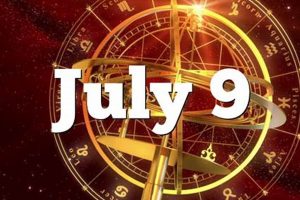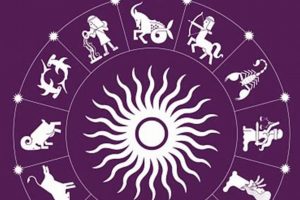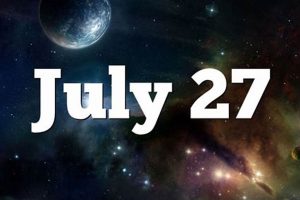Individuals born under the sign of Virgo between approximately August 23rd and September 22nd, whose birthdays fall in July, do not exist. The astrological sign of Virgo begins in late August. Those born in July fall under either the sign of Cancer (June 21st – July 22nd) or Leo (July 23rd – August 22nd). It’s important to understand the difference between sun signs, which are determined by the time of year, and other astrological placements, such as moon signs and rising signs, which are determined by the specific time and location of birth.
Astrology provides a framework for understanding personality traits and potential life paths based on celestial positions at the time of birth. While a person’s sun sign offers a general overview, a complete astrological chart, including the positions of the moon, planets, and other celestial bodies, provides a much deeper and more personalized analysis. This personalized analysis is beneficial for self-reflection and understanding one’s strengths, weaknesses, and potential. It’s important to note that the serious study of astrology requires in-depth knowledge and goes beyond simply knowing one’s sun sign.
This misunderstanding of the Virgo timeframe underscores the need for precision in astrological discussions. To accurately explore astrological influences, it’s essential to consult credible resources and understand the complexities of astrological charts. This foundation allows for meaningful exploration of specific placements within a birth chart, regardless of the month of birth, and facilitates a more nuanced understanding of astrological influences.
Understanding Astrological Timing
Accuracy is crucial when exploring astrological influences. The following tips offer guidance for navigating astrological information and avoiding common misconceptions, particularly concerning the relationship between sun signs and specific timeframes.
Tip 1: Verify Sun Sign Dates: Consult reputable astrological resources to confirm the precise dates for each sun sign. Note that these dates can vary slightly from year to year due to the Earth’s rotation.
Tip 2: Differentiate Between Sun, Moon, and Rising Signs: One’s sun sign represents a core aspect of personality, but a comprehensive astrological profile requires understanding the influence of the moon and rising signs as well. These are determined by the exact time and location of birth.
Tip 3: Avoid Generalizations: While sun sign descriptions offer general characteristics, they do not encompass the full complexity of an individual’s astrological profile. Avoid making assumptions based solely on sun signs.
Tip 4: Consult Professional Astrologers: For personalized insights, consult qualified astrologers who can create and interpret a complete birth chart. This provides a much more nuanced understanding than generalized sun sign descriptions.
Tip 5: Research Astrological Concepts: Deeper understanding of astrological principles, such as planetary aspects and houses, allows for a more informed interpretation of astrological information.
Tip 6: Focus on Self-Discovery: Use astrology as a tool for self-reflection and personal growth. Understanding one’s astrological profile can provide insights into strengths, weaknesses, and potential life paths.
By applying these tips, individuals can approach astrology with greater clarity and avoid misunderstandings, leading to a more meaningful exploration of its potential benefits.
This exploration of astrological timing sets the stage for a deeper dive into the complexities of individual birth charts and the wealth of information they contain.
1. Virgo
The phrase “Virgo: Earth sign” highlights a fundamental astrological concept crucial for understanding the inherent contradiction in “Virgo July astrology.” Virgo, as an Earth sign, possesses specific characteristics associated with groundedness, practicality, and analytical thinking. These traits are attributed to the element of Earth and are considered defining features of individuals born under this sign. However, the inclusion of “July” introduces a conflict, as Virgo’s astrological timeframe falls between late August and September, not July. This discrepancy underscores the importance of accurate birthdate information for astrological interpretations. Applying the Earth sign qualities of Virgo to someone born in July, therefore, would be astrologically inaccurate, leading to potentially misleading personality assessments.
For example, an individual born in early July would fall under the sign of Cancer, a Water sign characterized by emotional sensitivity and intuition. Ascribing Virgo’s Earth sign traits of practicality and analytical thinking to this individual would be a misapplication of astrological principles. Similarly, those born in late July fall under Leo, a Fire sign known for expressiveness and dynamism. Confusing these fundamental elemental qualities due to an incorrect timeframe can lead to a flawed understanding of astrological influences.
In summary, “Virgo: Earth sign” serves as a reminder of the structured nature of the zodiac. Each sign occupies a specific timeframe and possesses distinct elemental qualities. The “virgo july astrology” phrase exemplifies a common misunderstanding that can lead to misinterpretations. Accurate birthdate information is paramount for applying astrological principles correctly and deriving meaningful insights from birth chart analysis.
2. July
The phrase “July: Cancer/Leo timeframe” directly contradicts the concept of “Virgo July astrology.” This contradiction stems from a fundamental misunderstanding of astrological timing. The zodiac, a twelve-sign cycle, allocates specific timeframes to each sign. July falls entirely within the domains of Cancer (approximately June 21st – July 22nd) and Leo (approximately July 23rd – August 22nd). Virgo’s timeframe begins in late August, making the notion of a “Virgo in July” astrologically impossible. This highlights a common error: conflating sun signs with specific months. While sun signs are determined by the time of year, their precise dates vary annually. Therefore, assuming someone born in July is a Virgo demonstrates a lack of understanding regarding astrological principles. This inaccurate association undermines the precision required for meaningful astrological interpretation.
Consider two individuals: one born on July 10th and another on July 30th. The first falls under Cancer, characterized by emotional depth and nurturing tendencies. The second is a Leo, known for expressiveness and a flair for the dramatic. Attributing Virgo characteristics, such as practicality and analytical skills, to either individual based solely on their birth month ignores their actual astrological placements and leads to a misrepresentation of their personalities as understood through an astrological lens. The implications of this misunderstanding extend beyond individual interpretations. It affects the credibility of astrological discussion and can perpetuate misinformation. For example, generalized horoscopes that assign Virgo traits to July birthdays mislead readers and reinforce inaccurate astrological associations.
Accurate timeframes are essential for applying astrological principles correctly. “July: Cancer/Leo timeframe” underscores this importance by highlighting the incompatibility of “Virgo July astrology.” Understanding the distinct characteristics of Cancer and Leo, and their respective placements within the zodiac cycle, allows for more meaningful interpretations. It also provides context for critically evaluating astrological information and avoiding common misconceptions. This understanding is fundamental for anyone seeking to explore astrology beyond superficial sun sign descriptions and delve into the complexities of birth chart analysis and personalized astrological insights.
3. Astrology
Astrology: Interpretive practice clarifies the inherent contradiction in “Virgo July astrology.” Astrology functions as a symbolic language, not a predictive science. It requires careful interpretation of celestial positions at the time of birth, not simply matching sun signs to calendar months. The phrase “Virgo July astrology” exposes a common misunderstanding of this interpretive process, emphasizing the need for precision and a nuanced approach to astrological analysis.
- Symbolic Language:
Astrology uses celestial positions as symbols to represent personality traits and potential life paths. It doesn’t dictate fate, but offers a framework for self-understanding. Virgo July astrology misinterprets this symbolic language by assigning Virgo traits to a timeframe occupied by Cancer and Leo. This demonstrates a literal rather than symbolic understanding, leading to inaccurate interpretations.
- Birth Chart Analysis:
A comprehensive birth chart provides a personalized astrological profile based on the precise time, date, and location of birth. It considers the positions of the sun, moon, planets, and other celestial bodies. Virgo July astrology ignores this complexity, focusing solely on sun signs. A proper birth chart reading for someone born in July would reveal Cancer or Leo influences, not Virgo.
- Time and Place:
Astrological interpretations are time and location dependent. The zodiac is a cyclical system, and the precise moment of birth determines the placement of celestial bodies within that cycle. Virgo July astrology disregards this crucial factor. Two individuals born in July, even on the same day but at different times and locations, can have significantly different astrological profiles.
- Nuance and Complexity:
Astrology requires a nuanced approach. Generalizations based solely on sun signs offer limited insights. Virgo July astrology represents such an oversimplification. A deeper understanding of planetary aspects, houses, and other astrological concepts is necessary for accurate interpretations. This complexity necessitates careful study and a willingness to move beyond simplistic associations between signs and months.
The interpretive nature of astrology highlights the fallacy of “Virgo July astrology.” Astrology is a complex system requiring precise information and nuanced interpretation. Reducing it to simple sun sign-month associations undermines its depth and leads to inaccurate conclusions. Understanding astrology as an interpretive practice requires moving beyond superficialities and engaging with its symbolic language and complex calculations for a more meaningful and accurate understanding.
4. Sun signs
Understanding the relationship between sun signs and core personality is crucial for deciphering the inherent contradiction in “Virgo July astrology.” Sun signs represent a fundamental component of astrological profiles, offering insights into an individual’s basic temperament and behavioral tendencies. However, the notion of a “Virgo in July” clashes with this foundational principle, as Virgo’s designated timeframe falls within late August and September, not July. This discrepancy emphasizes the importance of accurate birthdate information and the need to distinguish between sun signs and specific months.
- Zodiacal Timeframes:
Each sun sign occupies a specific segment within the 360-degree zodiacal wheel. These segments align with approximate date ranges, not entire calendar months. Virgo’s timeframe, typically late August to September, never overlaps with July. Attempting to assign Virgo characteristics to someone born in July disregards these fundamental zodiacal divisions. For instance, someone born on July 15th falls under Cancer, not Virgo, and their core personality would reflect Cancerian traits like emotional sensitivity and nurturing instincts, not Virgoan practicality and analytical skills.
- Elemental Influences:
Each sun sign is associated with one of four elements: fire, earth, air, or water. Virgo is an Earth sign, characterized by practicality, groundedness, and analytical thinking. July encompasses two different elemental influences: Water (Cancer) and Fire (Leo). Ascribing Virgo’s Earth sign traits to individuals born under the Water sign of Cancer or the Fire sign of Leo misrepresents their core personalities. A Cancer’s emotional depth differs significantly from a Virgo’s pragmatic nature, and a Leo’s fiery expressiveness contrasts sharply with Virgo’s reserved demeanor.
- Planetary Rulership:
Each sun sign is ruled by a specific planet, which further contributes to its core personality characteristics. Virgo is ruled by Mercury, the planet associated with communication, intellect, and detail-oriented thinking. July’s signs, Cancer and Leo, are ruled by the Moon (emotions, nurturing) and the Sun (self-expression, vitality), respectively. Attributing Mercury’s influence to someone born under the rulership of the Moon or the Sun creates a fundamental mismatch in astrological interpretation. This planetary mismatch can lead to inaccurate assessments of personality and potential.
- Modalities:
Astrological signs are also categorized by modalities: cardinal, fixed, and mutable. These modalities reflect an individual’s approach to life and their preferred mode of operation. Virgo is a mutable Earth sign, adapting and refining situations with practicality. Cancer is a cardinal Water sign, initiating action based on emotional intuition. Leo is a fixed Fire sign, maintaining a steady focus on self-expression. The “Virgo July astrology” confusion overlooks these modal differences. Attributing Virgo’s mutable Earth energy to a Cancer’s cardinal Water energy or a Leo’s fixed Fire energy ignores fundamental differences in how they engage with the world.
The concept of “Sun signs: Core personality” underscores the fallacy of “Virgo July astrology.” Attributing Virgo characteristics to individuals born in July misrepresents their core personalities, determined by their actual sun signs, Cancer or Leo. Understanding the zodiacal timeframes, elemental influences, planetary rulerships, and modalities associated with each sign is essential for accurate astrological interpretation. Ignoring these fundamental principles leads to misleading generalizations and diminishes the potential insights offered by a more nuanced astrological perspective.
5. Birth charts
The concept of “Birth charts: Personalized analysis” exposes the fundamental flaw in “Virgo July astrology.” Birth charts provide a comprehensive and individualized astrological profile based on the precise date, time, and location of birth. This personalized approach contrasts sharply with the generalized notion of assigning sun signs based solely on birth months, as exemplified by the erroneous phrase “Virgo July astrology.” A birth chart considers the placement of all planets, not just the sun, within the zodiac at the moment of birth. This detailed mapping reveals a complex interplay of planetary influences, offering far more nuanced insights than sun sign generalizations.
Consider two individuals, both born on July 15th. One is born at 6:00 AM in London, and the other at 6:00 PM in Los Angeles. While both fall under the sun sign of Cancer, their birth charts would differ significantly. The London-born individual might have a Leo ascendant, influencing their outward personality and how they approach the world. The Los Angeles-born individual might have a Pisces ascendant, imbuing them with greater sensitivity and intuition. Furthermore, the positions of the moon, Mercury, Venus, Mars, and other planets would also vary, creating unique astrological profiles reflecting distinct personality traits, strengths, and challenges. Attributing Virgo characteristics to either individual based solely on the month of July ignores the complexity revealed by their individual birth charts and reinforces the misconception inherent in “Virgo July astrology.”
The practical significance of birth chart analysis lies in its potential for self-discovery and personal growth. Understanding the specific planetary influences in one’s chart can provide insights into one’s emotional nature, communication style, relationship patterns, and overall life path. This personalized understanding contrasts starkly with the limited scope of generalized sun sign descriptions. The “Virgo July astrology” example highlights the importance of moving beyond simplified astrological interpretations and embracing the complexity of birth chart analysis. Only through a personalized approach can individuals gain a deeper understanding of their astrological influences and leverage this knowledge for self-awareness and informed decision-making.
6. Time of birth
The phrase “Time of birth: Crucial factor” directly contradicts the flawed concept of “Virgo July astrology.” Accurate birth time is paramount in astrology, determining the Ascendant (rising sign) and the placement of planets within the twelve astrological houses. “Virgo July astrology” ignores this crucial factor, erroneously assigning Virgo characteristics based solely on the month of July. This oversimplification disregards the fundamental principles of astrological calculations and the importance of precise birth data.
Consider two hypothetical individuals, both born on July 15th. Individual A is born at 2:00 AM, while Individual B is born at 2:00 PM. Though sharing the same birth date and sun sign (Cancer), their rising signs and house placements would likely differ significantly. Individual A might have a Sagittarius rising, imbuing them with an adventurous and philosophical disposition. Individual B might have a Gemini rising, influencing them toward intellectual curiosity and communication. Furthermore, the planetary placements within their respective houses would vary, creating distinct astrological profiles with unique strengths, challenges, and life paths. Ascribing Virgo traits to either individual based solely on their July birth month disregards these crucial distinctions shaped by their differing birth times. This highlights the critical role of precise birth information in generating accurate astrological interpretations and the fallacy of associating Virgo with July.
The practical significance of accurate birth time extends beyond determining rising signs and house placements. It affects the calculation of planetary aspects, which represent the angular relationships between planets in a birth chart. These aspects, such as conjunctions, squares, and trines, signify dynamic interactions between planetary energies and add further complexity to an individual’s astrological profile. Without precise birth time, these calculations become unreliable, diminishing the accuracy and depth of astrological interpretation. The “Virgo July astrology” misconception underscores the need for precision in astrological practice. Accurate birth time is not merely a detail but a foundational element for generating meaningful astrological insights. Disregarding this factor undermines the interpretive power of astrology and perpetuates misleading generalizations. A robust understanding of astrological principles necessitates acknowledging the crucial role of birth time in creating personalized and accurate birth chart analyses.
7. Zodiac
Understanding the zodiac as a cyclical system is essential for recognizing the fundamental error in “Virgo July astrology.” The zodiac, a 360-degree circle representing the celestial path of the sun, is divided into twelve segments, each corresponding to an astrological sign. This cyclical nature implies a fixed sequence and specific timeframes for each sign. Virgo’s placement within this cycle, following Leo and preceding Libra, firmly situates it within the late August to September timeframe, not July. “Virgo July astrology,” therefore, contradicts the zodiac’s cyclical structure and highlights a misunderstanding of astrological timing.
- Fixed Sequence:
The zodiac’s signs follow a fixed, immutable sequence. This sequence, Aries, Taurus, Gemini, Cancer, Leo, Virgo, Libra, Scorpio, Sagittarius, Capricorn, Aquarius, Pisces, repeats perpetually. Virgo’s position within this sequence, after Leo and before Libra, determines its astrological timeframe. Assigning Virgo to July disrupts this established order and contradicts the fundamental structure of the zodiac. This fixed sequence is crucial for astrological calculations and interpretations.
- Specific Timeframes:
Each zodiac sign occupies a specific timeframe within the year, determined by the sun’s apparent passage through that segment of the ecliptic. Virgo’s timeframe typically falls between late August and September, never overlapping with July. The notion of “Virgo July astrology” disregards these established timeframes. Assigning Virgo characteristics to someone born in July, when the sun is transiting either Cancer or Leo, contradicts the basic principles of astrological timing. This misalignment can lead to inaccurate personality assessments and flawed astrological interpretations.
- Seasonal Correspondences:
The zodiac cycle aligns with the Earth’s seasonal cycle, reflecting the changing relationship between the sun and the Earth throughout the year. Virgo, associated with late summer/early autumn, embodies themes of harvest, organization, and refinement. July, conversely, corresponds to the height of summer, reflecting Cancer’s nurturing energy and Leo’s vibrant self-expression. Assigning Virgo’s autumnal qualities to individuals born in the summer months of July creates a dissonance between astrological symbolism and the actual seasonal context of their birth. This disconnect underscores the importance of aligning astrological interpretations with the natural rhythms of the Earth’s yearly cycle.
- Precession of the Equinoxes:
While the zodiac signs maintain their fixed sequence and symbolic meanings, the actual constellations they were originally based on have shifted over millennia due to the precession of the equinoxes, a slow wobble in the Earth’s axis. This astronomical phenomenon creates a distinction between the tropical zodiac, used by most Western astrologers, and the sidereal zodiac, which aligns with the current position of the constellations. However, even in sidereal astrology, Virgo’s placement does not fall within July. The “Virgo July astrology” confusion persists regardless of the zodiacal system used, further emphasizing its fundamental inaccuracy. Understanding the distinction between these systems, while important for advanced astrological study, does not validate the misattribution of Virgo to July.
The zodiac’s cyclical nature, with its fixed sequence, specific timeframes, and seasonal correspondences, directly contradicts the notion of “Virgo July astrology.” This misconception highlights the importance of understanding the zodiac as a structured system and the need for precise birth information in astrological interpretations. Attempting to assign astrological signs based solely on calendar months, without considering the zodiac’s cyclical framework, leads to inaccurate and misleading conclusions, undermining the potential insights offered by a more nuanced understanding of astrological principles.
Frequently Asked Questions
This section addresses common misconceptions surrounding the phrase “Virgo July astrology,” providing clarity and reinforcing accurate astrological principles.
Question 1: Can someone born in July be a Virgo?
No. Virgo’s astrological timeframe falls between approximately August 23rd and September 22nd. Individuals born in July are either Cancer or Leo.
Question 2: Why is the phrase “Virgo July astrology” misleading?
The phrase is misleading because it conflates calendar months with astrological sign timeframes. Astrological signs have specific dates that don’t align neatly with calendar months. Virgo’s dates never fall in July.
Question 3: What determines one’s astrological sign?
One’s sun sign is determined by the position of the sun within the zodiac at the moment of birth. A complete astrological profile requires a birth chart, which considers the placement of all planets and other celestial bodies.
Question 4: What if a horoscope assigns Virgo traits to someone born in July?
Generalized horoscopes often oversimplify astrological principles. A horoscope attributing Virgo traits to someone born in July is inaccurate and should be disregarded. Consult a reputable astrological resource for accurate information.
Question 5: How can one accurately determine their astrological profile?
Accurate determination requires a birth chart calculated using the precise date, time, and location of birth. Consulting a qualified astrologer or utilizing reputable astrological software can provide this information.
Question 6: Why is precision important in astrological interpretations?
Astrology is a symbolic language requiring precise calculations. Accurate birth data ensures the correct placement of celestial bodies within the birth chart, leading to more meaningful and reliable interpretations.
Understanding the zodiac’s cyclical nature and the importance of accurate birth information is crucial for navigating astrological interpretations effectively. Misconceptions, like the idea of “Virgo July astrology,” underscore the need for clarity and precision in astrological discussions.
This FAQ section has clarified common misunderstandings. The next section will explore the specific characteristics of Virgo and its placement within the zodiac cycle, further emphasizing the importance of accurate astrological timing.
Conclusion
Exploration of “Virgo July astrology” reveals a fundamental misunderstanding of astrological principles. Virgo, an Earth sign associated with specific personality traits and a distinct timeframe (late August-September), cannot coexist with July, a month occupied by the signs Cancer and Leo. This contradiction underscores the importance of accuracy in astrological interpretations. Precise birth information, particularly time of birth, is crucial for determining accurate planetary placements and generating meaningful insights. Generalized sun sign-month associations, as exemplified by “Virgo July astrology,” oversimplify a complex system requiring nuanced understanding. Accurate birth chart analysis, based on precise data, offers personalized insights far exceeding the scope of generalized descriptions.
Astrology serves as a tool for self-discovery, offering potential insights into personality, strengths, and challenges. However, its interpretive power hinges on accuracy and a deep understanding of its underlying principles. Moving beyond simplistic notions and embracing the complexities of birth chart analysis unlocks the true potential of astrological exploration. Precision, informed interpretation, and a commitment to understanding astrological fundamentals are crucial for deriving meaningful self-knowledge from this ancient practice. Continued exploration of astrological concepts empowers individuals to utilize this symbolic language effectively for personal growth and a deeper understanding of themselves and the world around them.







